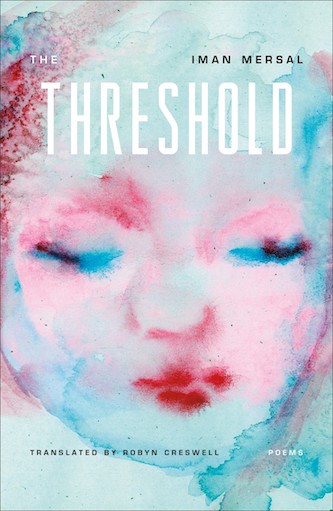Poetry Review: Iman Mersal’s “Threshold” — Exploring the Idea of Home
By James Kates
Underlying all of these pieces is the sensibility of the émigrée, the person who has had to reinterpret everything in her life.
Threshold by Iman Mersal. Translated from the Arabic by Robyn Creswell. FSG, 128 pages, $14.99.

“All of Mersal’s poems were originally written in prose — sometimes with line breaks, sometimes without . . . .”
I’m not certain what Iman Mersal’s translator Robyn Creswell means when he writes this.
Most of the poems in Threshold are presented by Creswell with line breaks, only thirteen are in prose. The translator worked closely with the poet in making this book, so it’s unclear to the reader how many of the pieces Creswell himself arranged into lined verse. It would help very much, too, if we had at least a sample of the original Arabic to understand the process of his translation.
In short, except for the messages found in the content — assuming I can trust the collaboration of the writer and the translator here — I am unsure how to read Threshold. Certainly, far too much of what passes for contemporary poetry is written “in prose — sometimes with line breaks, sometimes without,” but I expect some kind of music, some kind of patterning, some kind of game, to enrich and deepen my reading when I read a “poem.” And, at the very least, I expect a translator to help guide me through the intent and patterning of the original text. At times, I find that patterning in Creswell’s lines — or are they Mersal’s?
What exactly am I reading here — whose words, whose arrangements? — when the words on the page look like:
A respect for Karl Marx
is the one thing my lovers had in common.
I allowed all of them, though to differing extents,
to paw at the cotton dolls
hidden in my body.
Marx
Marx
I’ll never forgive him.
I also don’t understand the translator’s introductory assertion that “Mersal’s poems don’t often deal with historical events, and even go out of their way to avoid them.” Many of the pieces here are shot through with Egyptian and global happenings of the poet’s time, even if specific dates and references are not spelled out. They do not need to be, if the reader is at all attentive.
“. . . an Arab nationalist made his entrance, hair completely
white, as if he’d just been fighting off an invasion of the
midan down the street.
“The nation is on fire,” he said, instead of good
evening, and I started coughing from the smoke that
suddenly engulfed me.
All that said, and however negative this critique of the translator and his introduction may sound, I am astounded by the power of the best of the pieces in Threshold. They remind me in their passion, in their concentration, and in their engagement, of the poetry of the Russian poet Anna Akhmatova, both in her early lyrics and the elegies of her later life — and that is meant as high praise indeed.
There is a similar fierce, unflinching look at relationships, from both inside and outside.
I’ll greet your death as merely
the last thing you did to me
and won’t enjoy the relief I expected,
feeling that you’ve taken away
any chance to diagnose
the tumors that grew between us.
In the morning, I might be
surprised by swollen eyelids
and a knot in my back
that gets tighter and tighter.
There is a similar internalization of the political into the personal, as if, in Akhmatova’s formulation, she “like a river, / Was rechanneled by this stern age.”
It’s true
I was separated from the others by a parade of camels
emerging from the Arab League.
When we found each other again
we offered our cigarettes to a security guard
who didn’t know the name of the building he guarded
and finally arrived at a bar in the heart of the city
having broadened our horizons and earned a few scratches.
Underlying all these pieces is an exploration of the idea of home. From the early, moving sequence “The Clot” about her father’s dying, to the very last line of the book, “Let home be that place where you never notice the bad lighting, let it be a wall whose cracks keep growing until one day you take them for doors,” Mersal interrogates words from Dostoevsky that she cites early on, “Everyone needs a home, a somewhere they can go.” How would I be, the writer asks elsewhere, if I sat over there?
Also, underlying all of these pieces is the sensibility of the émigrée, the person who has had to reinterpret everything in her life — her family, her relationships, her landscapes — in the light of her uprooting from home and having to make a new one. Threshold tells a political story and a personal one.
J. Kates is a poet, feature journalist and reviewer, literary translator, and the president and co-director of Zephyr Press, a nonprofit press that focuses on contemporary works in translation from Russia, Eastern Europe, and Asia. His latest book of poetry is Places of Permanent Shade. Among his recent translations is Sixty Years: The Selected Poems of Mikhail Yeryomin, 1957-2017.
